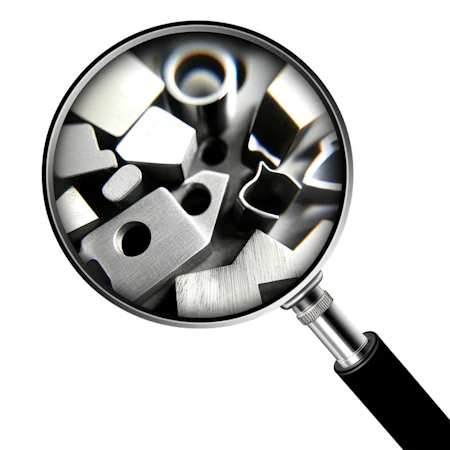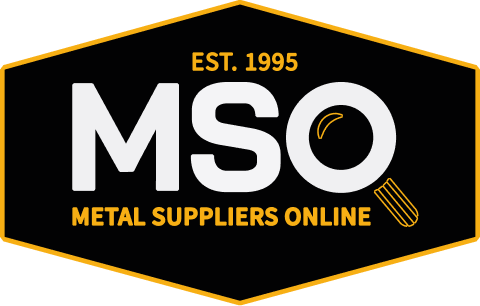Back To Browse
Titanium
Titanium 6-2-4-2
Aging Procedure
Hold at 538-593 C(1000-1100 F) for 8 hours, air cool.
Annealing Procedure
For duplex annealing, hold at 900 C(1670 F) for 1/2 hour, air cool to 788 C(1465 F) and air cool. For beta anneal, hold at 1024 C(1900 F) for 1/2 hour, air cool to 593 C(1100 F) for 8 hours and air cool.
Applications
Most commonly found in gas turbine compressor components, such as blades, discs and impellers. It is also used for sheet metal components in afterburners and "hot" airframe sections.
Cold Workability
The cold working characteristics of this alloy are similar to those found in austenitic stainless steels. In multiple forming operations, intermediate stress relieving is recommended to offset the alloy's tendency to work harden. Post-work annealing is recommended to reattain maximum performance characteristics.
Forgeability
Rough forge at 1038-1066 C(1929-1980 F), finish at 954-982 C(1770-1825 F).
Formability
This alloy can be hot or cold formed and will exhibit characteristics equivalent to those found in a 1/8 to 1/4 hard austenitic stainless steel.
Heat Treatability
Beta minus 14 C(25 F).
Hot Workability
Hot forming will reduce both the springback and required forming forces, and will increase the overall ductility of the material.
Machinability
As a family, titanium and its alloys have developed a mystique as a nightmare to machine. This is simply not the case. Experienced operators have compared its characteristics to those found in 316 stainless steel. Recommended practice includes high coolant flow(to offset the material's low thermal conductivity), slow speeds and relatively high feed rates. Tooling should be tungsten carbide designations C1-C4 or cobalt type high speed tools.
Other Physical Properties
Beta Transus (F +/- 25) 1820
Principle Design Features
This near alpha alloy is designed primarily for high temperature applications (up to 538 C). It combines excellent strength and corrosion resistance with relatively good weld and fabricability. Beta Transus (F +/- 25) 1820.
Weldability
Rated as "fair" in terms of weldability.
Known Forms
Bar-Hollow
Closed Die Forgings
Flanges
Flat Bar
Forgings-Discs
Hexagon Bar
Open Die Forgings
Pipe-Seamless
Pipe-Welded
Plate
Rings
Round Bar
Seamless Rolled Rings
Sheet
Sheet-Perforated
Square Bar
Strip
Tube-Round (Seamless)
Tube-Round (Welded)
Wire-Round
Wire-Welding
Billet
Coil
Contour Rings
Fasteners
Fittings
Forgings-Upset
Mandrel Rings
Shafts
Shapes-CD
Shapes-Extruded
Shapes-HR
Welded Rings
Additional Data
Specifications
4919,4952,4975,4976,3.7164,B50 TF22,B50TF21,B50TF22,C50TF7,F-83142,T-81915,T-9046,T-9047,1220,R54620Dismiss
Chemical Elements
| Aluminum | 5.5 - 6.5 |
| Carbon | 0.1 max |
| Hydrogen 2 | 0.15 max |
| Iron | 0.25 max |
| Molybdenum | 1.8 - 2.2 |
| Nitrogen | 0.5 max |
| Oxygen 2 | 0.15 max |
| Silicon | 0.06 - 0.1 |
| Tin | 1.8 - 2.2 |
| Titanium | Balance |
| Zirconium | 3.6 - 4.4 |
Physical Properties
Density: 0.164lb/in³
Electrical Resistivity: 171µΩ·cm
Melting Point: 3100°F
Specific Gravity: 4.54
Mechanical Properties
Modulus of Elasticity – Tension: 16.5MSI
Reduction of Area: 25%
Thermal Expansion
| Condition | Min | Max | Expansion Coefficient |
|---|---|---|---|
| Annealed | 32 °F | 212 °F | 4.3 µin/in/°F |
| Annealed | 32 °F | 600 °F | 4.5 µin/in/°F |
| Annealed | 32 °F | 1000 °F | 4.5 µin/in/°F |
Creep Test Data
| Condition | Form | Temperature | Time | Applied Stress | Creep Strain |
|---|---|---|---|---|---|
| Test Specimen Annealed | Sheet | 1000 °F | 1000 Hours | 0.01 % | 12 mil/in |
| Test Specimen Annealed | Sheet | 800 °F | 1000 Hours | 0.01 % | 58 mil/in |
Mechanical Test Data
| Form | Sheet |
| Condition | Test Specimen Annealed |
| Measurement Temperature | 70°F |
| Elongation | 10% |
| Reduction of Area | 25% |
| Tensile Strength | 130KSI |
| Yield Strength | 120KSI |
| Form | Sheet |
| Condition | Test Specimen Annealed |
| Measurement Temperature | 800°F |
| Form | Sheet |
| Condition | Test Specimen Annealed |
| Measurement Temperature | 1000°F |
Find the metal you're looking for today.

